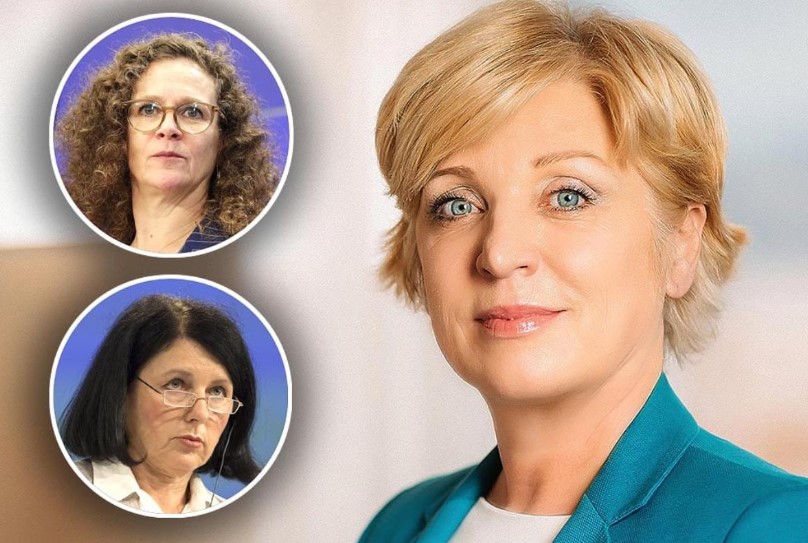Member of the European Parliament Romana Tomc has sent a letter to Vera Jourova, the Vice-President of the European Commission responsible for Values and Transparency, and Sophie in ‘t Veld, Chair of the Democracy, Rule of Law and Fundamental Rights Monitoring Groups, which is part of the Committee on Civil Liberties, Justice and Home Affairs (LIBE), in which she drew attention to the unacceptable developments at the national media outlet Radio-Television Slovenia (RTV Slovenija).
As the MEP wrote, the current Slovenian government is making systematic attempts to control RTV Slovenia. With the new Radio-Television Slovenia Act, they want to radically change the structure of the programme council and allow the ruling party and its supporters to freely edit the public service and its programme.
Since the announcement of the legislative changes in question, a number of former politicians from both sides of the political aisle, as well as academics and prominent lawyers, have spoken out against the proposed changes. In addition, 52,669 people
have signed a petition in support of a referendum on the Radio-Television Slovenia Act that was proposed by the government. There was more than enough support for a referendum to be called, which will be held on the 27th of November. This has completely infuriated the government, whose plans to get rid of the current leadership of RTV Slovenia have been thwarted by the voting public.
It is clear that the government is trying to starve RTV of public funds in order to force them into submission. Like many institutions in the current financial climate – a combination of energy crisis and rampant inflation – RTV Slovenia is in financial distress. The government has publicly stated that it will only help RTV Slovenia financially if and when the new law is adopted. Many see this as a form of blackmail by the executive branch of power, which is constitutionally obliged to ensure adequate funding for RTV Slovenia (as stated in a 2001 ruling of the Constitutional Court).
With the support of the Management Board and the Programme Council of RTV Slovenia, the Director-General of RTV Slovenia, Andrej Grah Whatmough, sent a letter to the Prime Minister on the 19th of September, 2022. In the letter, he points out that RTV has been making a financial loss since 2017 but that the current management has managed to reverse this trend and generate a profit of 2.5 million euros in the first half of 2022 through general cost-cutting and planned retirements. This will save RTV a total of 5 million euros per year. However, the Director-General also pointed out that the road to recovery has been made more difficult by the current energy crisis, citing the soaring cost of electricity, which has risen from 3 million in 2021 to 11 million in 2022. This has not only complicated efforts to restore RTV’s financial stability, but it also threatens the jobs of at least 300 RTV employees, which the public institution will not be able to retain if the current situation continues. The Director-General has therefore called on the Prime Minister to intervene and increase the RTV contribution or to help with a one-off financial injection, which is what the government has done with other public institutions.
Prime Minister feigns ignorance In his response to this appeal, the Prime Minister said that all the issues regarding the financing of RTV Slovenia could only be resolved once the new Radio-Television Slovenia Act came into force. The Director-General wrote a letter to the Prime Minister, the Ministry of Infrastructure, and the Ministry of Culture, reminding them that the government is constitutionally obliged to take care of RTV Slovenia’s finances. However, he received no response. After this calamity, he rightly noted that the government seems to think that the financial weakening of RTV Slovenia is a justified price to pay if it will ultimately lead to a leadership team being instated at RTV that will be politically loyal to the current government. All this while other public institutions have received generous one-off payments and subsidies to tackle the energy crisis.
It seems that the government is using its executive powers to force the current management of RTV Slovenia to resign before the referendum on the Radio-Television Slovenia Act. The current Radio-Television Slovenia Act has been put to the referendum test twice already, first when it was instated in 2005, and then again in 2011, when the then-government tried to replace it with a law very similar to the current one. Threats that RTV funding will only be regulated once the amended law
is in place put pressure on management and staff, who are forced to support the new law if they do not want to risk losing their jobs, and on voters, who believe that RTV Slovenia will go bankrupt if the new law is not supported in the referendum.
Thus, in her letter, MEP Romana Tomc called on the two addressees to dissuade the Slovenian government from trying to starve RTV Slovenia if the new law, which would consolidate political control over the public broadcaster, is not supported in the referendum.
Andrej Žitnik


